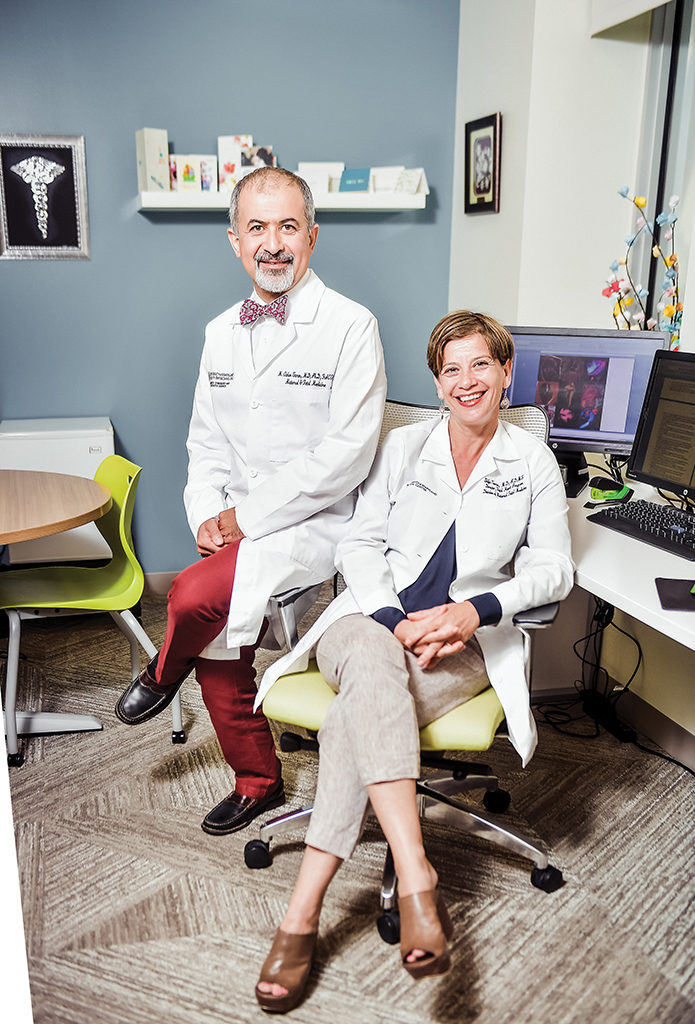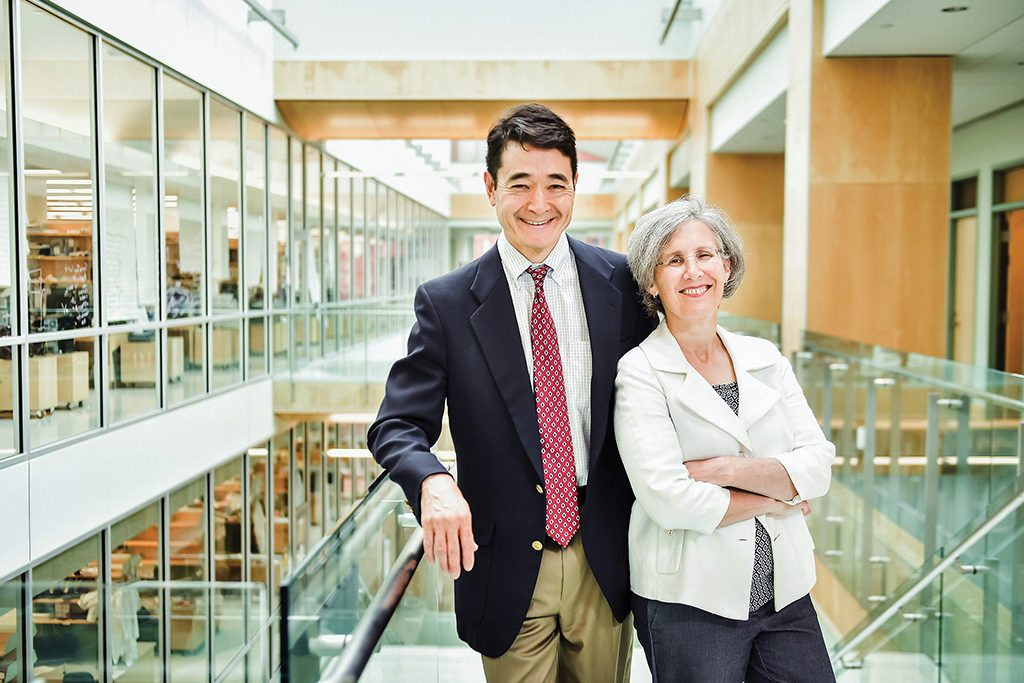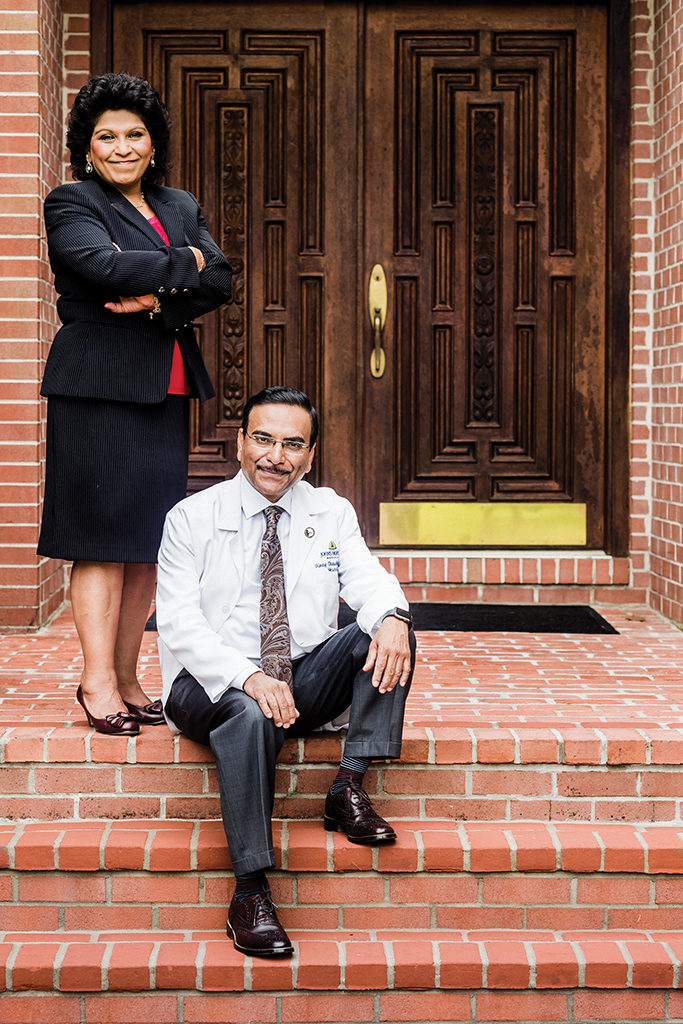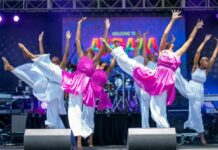Love typically defies logic, but doctors marrying doctors makes perfect sense, particularly in the world of academic medicine. The profession’s challenges — long shifts, the 2 a.m. call to the hospital, grant deadlines, late meetings, early rounds, conferences and on-call duties during holidays — can be hard on any partner. Who better to understand the calling than another physician? And, as Style discovered in profiling several of the region’s medical power couples, having a doctor for a spouse makes playing armchair-diagnostician while watching hospital TV dramas a lot more fun.
Vicki Handa, M.D., M.H.S.
Professor, Department of Gynecology and Obstetrics, Johns Hopkins University
Chair, Department of Gynecology and Obstetrics, Johns Hopkins Bayview Medical Center
Jim Handa, M.D.
Robert Bond Welch, MD Professor of Ophthalmology, Johns Hopkins’ Wilmer Eye Institute
Married since 1992
Vicki and Jim Handa met at a party for first-year students at the University of Pennsylvania School of Medicine in 1982. They dated throughout medical school, but subsequent training on separate coasts — Jim did his training at the Wills Eye Hospital in Philadelphia, while Vicki completed her residency at University of California San Francisco — kept them from marrying until a decade later. Their specialties, Jim notes, couldn’t be more different. He jokes that during his year-long retina fellowship, Vicki would ask him to read his research aloud to help her fall asleep. In contrast, “dinner conversation at OB/GYN events,” he says, “is quite different and graphic compared to eye-related events.”
Both chose highly academic positions in medicine and handle a full slate of teaching and research responsibilities in addition to seeing patients and surgery. “Medicine is not a job, but a lifestyle,” says Jim. “I can bounce concerns and wins off Vicki and she will be able to provide insight, sympathy, and joy more than someone outside of medicine. She understands when I have a late meeting, a grant deadline, or an emergency case.” Adds Vicki, “We share battle stories in teaching and applying for research grants.”
Every couple needs to be organized to keep life and work running smoothly, and dual-doctor couples especially so. “We were not the family who could make cookies at the last minute,” Vicki says. When their children were young — daughter Rebecca (21) is an environmental engineering major at Brown and son Robby (20) is majoring in statistics at the University of Michigan — the Handas purposely chose a daycare facility with finite hours vs. a nanny, which forced them to be home for family dinners. They arranged their schedules so they weren’t both in the operating room on the same day in case one of their kids got sick. “We joked that we were a well-oiled machine that doesn’t respond well to deviation,” chuckles Jim.
Vicki used to make a 5 a.m. grocery store run, the only time in their schedule for food shopping. Her final trip to the store was 12 years ago. As she was shopping, someone shouted that there was smoke in the store. “I thought, ‘I am not leaving without my groceries,’” she explains of her mad dash through the aisles. Evacuation began while she was in self-check-out. She left, groceries in hand — and set up home delivery the next day.
“For women in medicine, there is still data that most women do more than 50 percent of the household jobs,” she says. “I am really fortunate. Jim is much more engaged [than many husbands].”
Given their busy work lives, downtime means hanging out together or going to restaurants. Their DVR — Jim is a serious fan of The Voice — is full, and soon, Vicki hopes, her passport will be, too. Jim’s career takes him around the world, and before with kids at home, Vicki was unable to join him. And if she finds dinner conversations at his conferences a tad dry, she can always introduce the latest research in gynecology.
Madhu Chaudhry, M.D.
Head of Hematology, Greater Baltimore Medical Center
Vinay Chaudhry, M.D.
Professor of Neurology, Johns Hopkins School of Medicine
Married since 1986
Vinay and Maddie Chaudhry first spotted one other in October 1981 in the library at London’s Saint George’s Hospital Medical School. She was studying for her final year medical school examinations. Vinay, who had completed medical school at All India Institute of Medical Sciences in India, was preparing for the exam to practice medicine in the U.K.
Today, they agree on that meeting spot. After that, the details get a little hazy. He says he was the one who got up the nerve to talk to her, using the tried-and-true ruse of asking for directions. Maddie, though, remembers being the one to break the ice: “Vinay was rather shy and studious. I helped him get out of his shell.” As was the custom in their native India, a mutual friend formally introduced them and their initial dates were chaperoned.
They were married five and six years later. The first wedding in 1986 was a small affair with five guests in Kent, England. (The same day, a decidedly larger event was taking place: the marriage of Prince Andrew and the Duchess of York, Sarah Ferguson.) The Chaudhrys’ second wedding ceremony was on January 19, 1987, in India with Vinay arriving on horseback to a cheering throng of 500 guests. (For the record, Prince Andrew and the Duchess of York had 300 guests and clearly lacked the Chaudhrys’ staying power.)
At the time of marriage #1, theirs was an overseas, long-distance relationship with Vinay in his Neurology residency at University of Alabama and Maddie doing her family practice residency in Cambridge, England. “When I left the U.K for the States, I had to redo my residency,” Maddie says. She considered combining her husband’s focus on neuromuscular diseases with a corresponding residency in physical medicine, rehabilitation or rheumatology fields, but instead chose hematology.
“Our fields are sufficiently different that ‘shop talk’ doesn’t happen often,” Vinay says. One area of overlap: Because both of their specialties include ethical issues related to death, dying, hospice, and palliative care, they often discuss these difficult subjects.
Now empty-nesters — daughter Kavita (27) is a computer engineer in Washington D.C., V (25) is completing a Ph.D. in Anthropology at Northwestern, and Nikita (23) is an actor living in New York City — the Chaudhrys had a strict division of parenting duties. Vinay handled all shopping, kids’ activities (including birthday parties) and breakfast. Maddie made school lunches and dinner. “The secret is understanding each other’s busy schedules,” says Maddie. “Vinay has worked every Christmas for the past 30 years. I love to celebrate the holiday, but the kids had to wait until dad got home before they opened their presents.”
The couple says their work life has become busier, with carryout surpassing cooking. They do find time to take in some TV together. “When we watch medical shows like Grey’s Anatomy, we often challenge each other to guess the diagnoses and get a kick out of getting it right,” Maddie says. And they share hobbies including travel, eating out, reading, swimming and dancing, especially to Bollywood music. “We’re usually the first ones on the dance floor and the last to leave,” says Vinay.

Shifa Turan, M.D.
Assistant Professor, Obstetrics, Gynecology and Reproductive Sciences, University of Maryland School of Medicine
Founder and Director, Fetal Heart Program
Ozhan Turan, M.D. PhD
Associate Professor, Obstetrics, Gynecology and Reproductive Sciences, University of Maryland School of Medicine
Director, Fetal Therapy and Complicated Obstetrical Surgery
Married since 1997
There was only one surgeon Dr. Shifa Turan trusted to perform her cesarean section in December 1997: the attending physician who guided her when she performed her first cesarean as a resident at the University of Istanbul, Istanbul Medical School in Turkey.
That surgeon happened to be her husband, Dr. Ozhan Turan. “It was exciting to be the first one to touch my child,” he recalls proudly. “I was very calm and knew I was the best one to do the surgery.”
He was just as decisive when he first saw Shifa during her residency: “I knew that she was the one.” He proposed after a few dates, and they were married on February 28, 1997. Five years later, Shifa received a fellowship in fetal medicine at London’s Harris Birthright Research Center, King’s College Hospital. With son Ozerk in tow and Ozhan’s Ph.D. in Molecular Medicine completed, the Turans moved to the U.K. in 2002. Prior to the move, he had been directing a fertility clinic. During Shifa’s fellowship phone interview, the hospital also asked about Ozhan’s credentials and employed him, sight unseen, to work in high risk obstetrics and fetal medicine.
They’ve been working together in the same department ever since, even sharing the same office. “When we change jobs, we change together,” Shifa explains. Following London, they took a joint research position at Yale University before joining the faculty at the University of Maryland School of Medicine in 2006.
“We are very complementary to each other,” Ozhan explains. “She is a very talented diagnostician who can see the defect in a heart the size of a grain of rice, and I can do the very complex surgery to fix it.” Both have developed new techniques: his is a novel 2- and 3D ultrasound technique to predict preterm delivery; her is a 4D ultrasound method to diagnose fetal heart defects during the first trimester.
While living in England, the Turans also began co-authoring research papers. He loves the statistics, while she enjoys writing the introduction and conclusions of the papers they write together at home — a unique hobby to balance a shared love of yoga and photography. They even cook and clean together.
She claims they never fight, and he is hard pressed to find any negative about working so closely with his wife. “She does take a little too much time to get ready in the morning,” he laughs of their shared commute to the hospital. “I wait downstairs and try to get her to hurry up.”
Both are proud of their son’s decision to major in pre-med at the University of Miami, a choice influenced by the family’s shoptalk at dinnertime.
“We love our profession,” says Ozhan. “If I came into the world a second time, I would choose it. No matter what, you respect what your partner does, but when you are in the same field, you know what it means and it helps. I understand the leaving in the middle of the night to go to the hospital or missing holidays and birthdays. I can’t imagine being married to someone in another profession.”







Another great couple Dr. Wayne Mitzner of Johns Hopkins School of Public Health and Dr. Elizabeth Wagner of Johns Hopkins Bayview. They are absolutely brilliant and extremely grounded people.
Very much appreciated. Thank you for this excellent article. Keep posting!